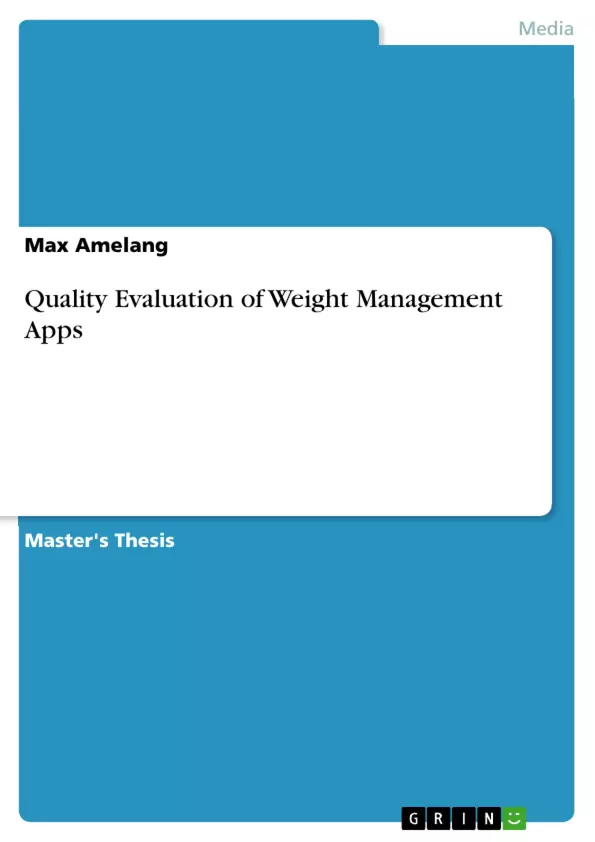Introduction – Obesity is a contributing factor to many diseases and is becoming a growing problem worldwide. Many apps have been developed to assist users in improving their weight management. However, given the speed at which apps are created, it is crucial to assess their quality regularly.
Objectives – This study aimed to evaluate the quality of weight management apps using comprehensive quality assessment criteria. By doing so, the information quality (RQ1) and system quality (RQ2) were determined, and relationships between these elements, user ratings, and app downloads (RQ3) were examined.
Methods – A systematic search in the US App Store using search terms related to weight management was performed. System quality was assessed using the Mobile App Rating Scale (MARS) and rated on a 5-point scale. The Taxonomy of Behavior Change Techniques (BCTs) was used to determine their presence or absence. A second reviewer coded 50% of the apps to account for interrater reliability. The descriptive and inferential statistical data analyses were carried out with SPSS.
Results – A sample of N = 38 apps was deemed eligible for this review. On average, 9.6 BCTs were identified per app (range: 3–19). The most frequently used BCTs were Provide instructions (87%) and Prompt self-monitoring (87%). The MARS overall quality scores indicated moderate system quality (M = 3.48; SD .61). Functionality was the highest-scoring MARS domain (M = 3.52; SD .68), while Aesthetics (M = 3.40; SD .84) scored the lowest. Significant positive correlations were identified between the overall MARS score, the number of BCTs, and app downloads.
Conclusion – Establishing a standardized framework for quality evaluation would increase the comparability of assessments and the significance for users. Based on the present findings, future app development should involve more health professionals, integrate more evidence- based content, and incorporate more effective BCTs for weight management.
Inhaltsverzeichnis (Table of Contents)
- Introduction
- Research Topic
- Relevance of the Topic
- Description of the Research Subject
- State of Research and Theory
- State of Research
- Quality Assessments of mHealth Apps
- Behavior Change Technique Incorporation
- Theoretical Background
- Social Cognitive Theory
- Theory of Reasoned Action / Planned Behavior
- Information-Motivation-Behavioral Skills Model
- Operant Conditioning
- Control Theory
- State of Research
- Research Problem
- Conceptual Framework
- Research Questions
- Methods
- Study Design
- Operationalization and Instruments
- Information Quality
- System Quality
- Sampling
- Data Collection
- Data Analysis
- Research Ethics
- Results
- App Selection
- App Characteristics
- Information Quality - (RQ1)
- System Quality - (RQ2)
- Relationships - (RQ3)
- Qualitative Examples
- App Fastyle
- App Fresh Tri
- App GPlans
- App YAZIO
- App Zero
- Discussion
- Summary and Interpretation of Main Results
- Information Quality - (RQ1)
- System Quality - (RQ2)
- Relationships - (RQ3)
- Limitations of the Study
- Discussion of Future Research and Applications
- Summary and Interpretation of Main Results
Zielsetzung und Themenschwerpunkte (Objectives and Key Themes)
This study aims to evaluate the quality of weight management apps using comprehensive quality assessment criteria. It examines the information quality and system quality of these apps and explores the relationships between these elements, user ratings, and app downloads. The study also seeks to understand the characteristics of successful weight management apps by examining which behavior change techniques are most commonly used and how they contribute to user engagement.
- Evaluating the quality of weight management apps
- Examining the role of information and system quality in app success
- Exploring the relationship between app features, user ratings, and app downloads
- Identifying the most effective behavior change techniques for weight management
- Providing insights for future app development and improvement.
Zusammenfassung der Kapitel (Chapter Summaries)
The study begins by outlining the relevance and description of the research subject. It then delves into the current state of research and theoretical framework, exploring previous research on quality assessments of mobile health apps and the incorporation of behavior change techniques. The research problem is defined, outlining the conceptual framework and research questions. The study's methodology is explained, including the study design, operationalization of key variables, sampling method, data collection process, and data analysis techniques. The findings are presented, covering app selection, app characteristics, information quality, system quality, relationships between different variables, and qualitative examples of specific apps. Finally, the discussion section summarizes the main results, addresses limitations of the study, and explores potential future research directions.
Schlüsselwörter (Keywords)
This study focuses on the quality evaluation of weight management apps, examining key factors such as information quality, system quality, user ratings, app downloads, and the role of behavior change techniques. The study utilizes the Mobile App Rating Scale (MARS) and the Taxonomy of Behavior Change Techniques to assess the effectiveness of these apps.
Frequently Asked Questions
How was the quality of weight management apps evaluated?
Quality was assessed using the Mobile App Rating Scale (MARS) for system quality and the Taxonomy of Behavior Change Techniques (BCTs) for information quality.
What are Behavior Change Techniques (BCTs)?
BCTs are evidence-based strategies used in apps, such as providing instructions or prompting self-monitoring, to help users change their health behaviors.
Which BCTs were most common in the studied apps?
The most frequent techniques were "Provide instructions" and "Prompt self-monitoring," found in 87% of the evaluated apps.
Is there a link between app quality and downloads?
Yes, the study found significant positive correlations between higher overall quality (MARS score), the number of BCTs included, and the number of app downloads.
What are the recommendations for future app development?
Future development should involve more health professionals, integrate evidence-based content, and focus on more effective BCTs for weight management.
- Citar trabajo
- Max Amelang (Autor), 2021, Quality Evaluation of Weight Management Apps, Múnich, GRIN Verlag, https://www.grin.com/document/1223353



